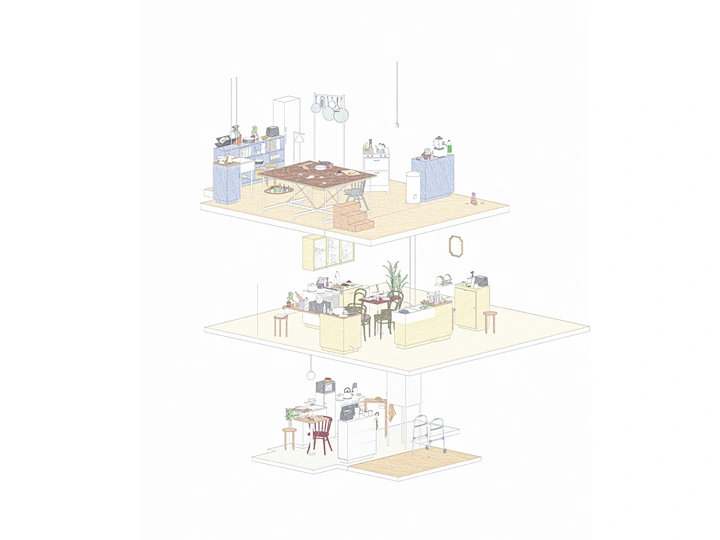The(Fun For)Kitchen:Questioning the Standard Space

Masashi Kajita
I’m a spatial and transdisciplinary designer from Barcelona, now living in Copenhagen. I recently finished my master’s in Spatial Design at the Royal Academy of Copenhagen and I am excited to continue developing the research I began during my studies. My background in Space and Interior Design has given me a solid foundation in understanding how environments influence people’s everyday lives.
In my work and research going forward, I focus on creating spaces that thoughtfully consider context, users, materials, and sensory experiences, often using a feminist perspective to uncover hidden power dynamics and question traditional roles. I enjoy blending thorough research, storytelling, and hands-on design to develop fresh ways of addressing today’s social and spatial challenges.
One of my key interests is domestic spaces—particularly the kitchen and food rituals—as sites shaped by hidden social rules and emotional dynamics that often go unnoticed. Through speculative design, I aim to question taken-for-granted norms and open new possibilities for how people relate to their environments.
I see design not just as creating new things, but as a tool to communicate and frame everyday challenges. Rather than offering immediate solutions, I focus on identifying the problem and making these ideas accessible—inviting everyone to join the conversation in a way that’s clear and inclusive, not overly intellectual. I have also been very interested in exhibition design, presenting ideas, and creating workshops as tools for communication and conversation starters, and I’m eager to improve and develop my skills in these areas.
I believe that through design we can explore connections between people and the spaces they inhabit, making everyday life more coherent and inclusive.
This project critiques the standardised kitchen—not to offer direct solutions, but to raise questions through speculative design. I began this work from a feminist desire to rethink domesticity and question the role of reproductive labour in our daily lives. I was curious about the hidden rules, roles, and assumptions embedded in kitchen design—how fixed, taken for granted, and rarely questioned it has remained, despite its central role in daily life and the diversity of its users.
The project initially took the Frankfurt Kitchen as a point of departure—an iconic example of how spatial design shapes social roles. While conceived as a feminist statement of efficiency and progress, it also laid the groundwork for the modern modular kitchen, rooted in fixed positions, tasks, and users.
My first exploration focused on film. I’ve built an archive of kitchens portrayed in movies across cultures and eras, where different types of families and routines challenge conventional models. These kitchens reveal social behaviours, emotional patterns, and unspoken rituals we rarely consider in spatial design.
The next steps involve expanding this archive while developing speculative designs that reflect new behaviours and emotional engagements with the kitchen. What if the kitchen were a space for dancing, grieving, or play? What if it responded to users differently? These proposals may also include designed objects with a performative character, activating new forms of interaction and embodied use within the space.
Through objects, drawings, and models, the project visualises these “living kitchens,” questioning the rigidity of the standard layout. It invites viewers to rethink domestic comfort—not as a fixed idea, but as something culturally shaped and personally redefined.
The project reflects critical thinking, playfulness, and a deep interest in how space shapes life. It aims to open dialogue around identity, emotion, and spatial equity through design.